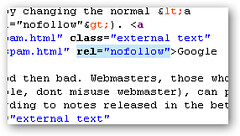Saturday, August 18, 2007
Top Technology Blogs Retaliate Against Wikipedia Nofollow
 I was reading a few popular technology blogs recently (no names), and I noticed a funny thing: every time a Wikipedia link was mentioned in a post, it was tagged with a nofollow attribute.
I was reading a few popular technology blogs recently (no names), and I noticed a funny thing: every time a Wikipedia link was mentioned in a post, it was tagged with a nofollow attribute.
Nofollow tells search engines to ignore a link as a "vote" for the website it points to. Google's PageRank algorithm is the most famous example of how links are used to determine the relevance of webpages.
Wikipedia started adding the nofollow attribute to outgoing links back in January 2007 so websites that were mentioned in Wikipedia articles would no longer see a search engine boost. Wikipedia articles tend to highly ranked in almost every category so websites used to get a huge boost by being mentioned. For example, almost a quarter of Wikipedia's traffic comes from being listed prominently in Google search results.
It looks like some bloggers are retaliating by nofollowing Wikipedia links in their posts. It's an issue of basic fairness. One analogy that's used is that links to Wikipedia disappear into a black hole because link power flows in, but it doesn't flow out. Only Wikipedia benefits.
If you feel that's unfair, all you need to do is add rel="nofollow" to your Wikipedia links. As an example, I added the nofollow attribute to the link to the Wikipedia article on nofollow above. If you have trouble, you can see how it's implemented by viewing the HTML source.
WordPress bloggers have it easier: just install the Wikipedia Nofollow plugin.
Labels: Technology







